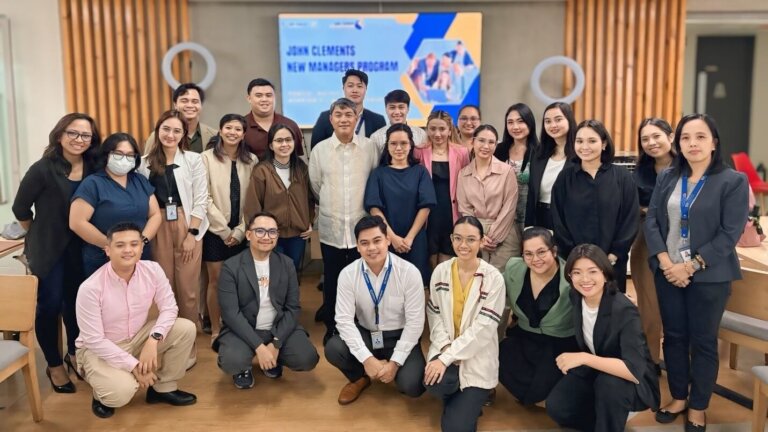On March 5, 2025, John Clements Consultants conducted the second session of the New Managers Program, focusing on the theme “Getting Work Done Through Others: Delegating.” Beyond task distribution, effective delegation was emphasized as a strategy for cultivating trust, strengthening communication, and fostering professional development.
This article explores key strategies, common challenges, and the long-term benefits of delegation.

Overcoming the Fear of Letting Go
Many new leaders hesitate to delegate responsibilities, fearing that relinquishing control may lead to mistakes. Managing all tasks alone seems like the best approach, offering a sense of order and certainty. However, this often results in burnout, excessive stress, and an overwhelming workload that hinders individual and team growth. The pressure to oversee every detail can become counterproductive, diverting focus from strategic decision-making and long-term goals.
When applied effectively, delegation is not just a redistribution of work but a tool for empowerment and efficiency. Shifting from micromanagement to mentorship strengthens trust, enhances collaboration, and boosts productivity. By embracing this approach, leaders alleviate their own burdens while fostering an environment where employees feel valued and motivated. This method optimizes workflow, improves problem-solving, and enhances team dynamics, reinforcing the idea that great leadership lies in guiding and empowering others.
Building Trust to Encourage Ownership
Trust is the foundation of successful leadership. When responsibilities align with individual strengths, employees take initiative, refine their skills, and build confidence. Delegation, when done right, evolves from a simple work distribution tactic into a leadership development strategy that promotes accountability and professional growth.
A culture of trust increases ownership and motivation, encouraging employees to take responsibility for their work. As their roles expand, they gain confidence and become more effective team members. A well-structured delegation approach cultivates a team that operates with independence and efficiency.

Establishing Clear Communication
Assuming that instructions are always understood is a major obstacle in effective delegation. Poor communication often leads to errors and delays. Providing clear guidelines—including objectives, expectations, and relevance to broader goals—enhances accountability and improves workflow.
Structured communication minimizes misunderstandings and boosts efficiency. Defined frameworks and feedback mechanisms help ensure high-quality output. An open-door leadership style fosters transparency, enabling concerns to be addressed promptly and reinforcing team cohesion.
Balancing Guidance and Autonomy
Striking the right balance between supervision and autonomy is essential. Excessive oversight stifles creativity, while too little direction causes uncertainty. Effective leadership involves providing the necessary support while allowing employees the freedom to take ownership of their delegated responsibilities.
Overly hands-on management can lower morale, while a lack of guidance may lead to confusion. Finding the right balance ensures that employees feel both supported and empowered, leading to sustained workplace productivity.

Long-Term Benefits of Delegation
Delegation goes beyond workload distribution—it enhances efficiency and fosters professional development. By entrusting responsibilities, leaders can focus on strategic initiatives while strengthening their team’s expertise. Employees who take on greater responsibilities develop leadership readiness and proactive problem-solving skills.
Beyond immediate productivity gains, empowering employees builds organizational resilience. A workforce that continuously develops its skills can adapt more easily to changing demands. A culture of accountability reduces the need for constant supervision, fostering a self-sufficient and capable team.
Continuous Learning and Adaptation
Leadership is a dynamic skill that evolves with experience. As team capabilities grow, leaders must adjust their delegation strategies accordingly. Open discussions about best practices encourage continuous improvement and collective success.
Refining delegation strategies is an ongoing process. What works for one team may not suit another, requiring flexibility based on individual strengths and organizational objectives. Leaders who continuously refine their methods ensure that teams remain efficient despite evolving circumstances.

A Pathway to Growth
Effective leadership is a catalyst for organizational success. Leaders who master the art of delegation build stronger teams, create space for strategic thinking, and cultivate an environment where individuals feel valued. Trusting capable team members fosters collaborative leadership, resilience, and innovation.
A well-managed workplace enhances efficiency and long-term success. By implementing strong delegation strategies, team productivity rises, job satisfaction improves, and workplace culture flourishes. Thoughtful delegation paves the way for shared achievements, ensuring that both leaders and their teams reach their full potential.
Take Your Leadership to the Next Level
Mastering delegation is key to building stronger teams and driving efficiency. At John Clements Consultants, we equip leaders with the skills to delegate effectively, fostering trust and productivity.
Ready to enhance your leadership approach? Contact us today to learn more about our leadership development programs!





